Shedding Light on Summer Sun: Does UV Exposure Affect the Skin Microbiome?
- Marya Sheikh-Ahmed
- Sep 18, 2024
- 2 min read

The skin microbiome is influenced by various environmental factors, with ultraviolet (UV) exposure being a significant one. Current research is exploring the impact of UV rays on the skin microbiome and developing innovative solutions to prevent sun damage while preserving the microbiome's delicate balance.
What We Know:
Certain bacteria and fungi have been observed to respond to UV exposure by producing melanin as a protective measure. These include species such as Cladosporium spp., Sporothrix Schenckii and Cryptococcus neoformans (Woo et al., 2022).
A study recruited 21 participants who spent at least 7 days in a sunny holiday destination and compared their skin microbiome samples taken before the trip and up to 84 days after their return. The dominant bacterial phyla at all time points were Actinobacteria, Proteobacteria and Firmicutes. However, by day 28 post-holiday, all participants exhibited significant changes in microbial beta diversity (Willmott et al., 2023).
Participants identified as “sun-seekers" showed an immediate reduction in Proteobacteria just one day after their holiday, though these levels gradually recovered over time. These results, among others, suggest that sun exposure can alter the diversity and composition of the skin microbiome, which may have downstream effects on skin health (Willmott et al., 2023).
Lactobacillus crispatus possesses UV-protective properties. However, because of the variable response of skin microbes to UV exposure, sunscreen can reduce skin microbiome diversity. One study showed that the application of SPF 20 sunscreen was correlated with a decrease in Cutibacterium acnes levels following UV exposure (Schuetz et al., 2024).
Industry Impact and Potential:
Beame is soon to introduce their upcoming "Something You Mist SPF 30 Face Mist," the world’s first SPF product with stress-reducing benefits. This breakthrough formula features neurophroline, a natural active ingredient derived from the seeds of the wild indigo plant (Tephrosia purpurea), which helps balance cortisol levels, protecting against stress-induced ageing while boosting skin brightness.
Products like Beame's align with emerging skincare trends such as psychodermatology, which integrates mental wellness into skincare by treating skin conditions while also addressing their psychological impact, and neurocosmetics, which utilise active ingredients to harness the connection between the skin, nervous system and brain, aiming to enhance both skin quality and mood (Rizzi et al., 2021).
Our Solution:
Sequential offers a comprehensive, end-to-end microbiome product testing solution, enhanced by specialised product development and formulation services. Leveraging our deep expertise, we help businesses create innovative skin products, including topical sunscreens and photoprotective solutions, that safeguard microbiome integrity while promoting overall skin health.
References:
Rizzi, V., Gubitosa, J., Fini, P. & Cosma, P. (2021) Neurocosmetics in Skincare—The Fascinating World of Skin–Brain Connection: A Review to Explore Ingredients, Commercial Products for Skin Aging, and Cosmetic Regulation. Cosmetics. 8 (3), 66. doi:10.3390/cosmetics8030066.
Schuetz, R., Claypool, J., Sfriso, R. & Vollhardt, J.H. (2024) Sunscreens can preserve human skin microbiome upon erythemal UV exposure. International Journal of Cosmetic Science. 46 (1), 71–84. doi:10.1111/ics.12910.
Willmott, T., Campbell, P.M., Griffiths, C.E.M., O’Connor, C., Bell, M., Watson, R.E.B., McBain, A.J. & Langton, A.K. (2023) Behaviour and sun exposure in holidaymakers alters skin microbiota composition and diversity. Frontiers in Aging. 4. doi:10.3389/fragi.2023.1217635.
Woo, Y.R., Cho, S.H., Lee, J.D. & Kim, H.S. (2022) The Human Microbiota and Skin Cancer. International Journal of Molecular Sciences. 23 (3), 1813. doi:10.3390/ijms23031813.
.png)



Comments